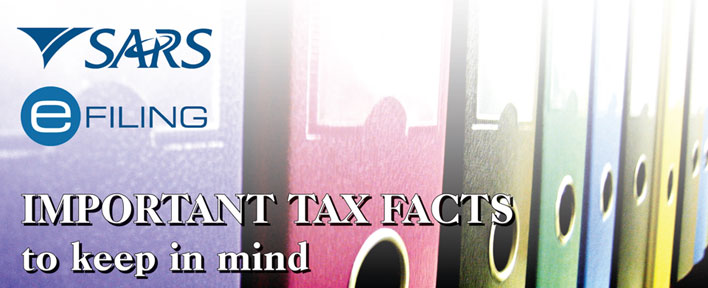Important tax facts to keep in mind
June 2015

This basic tax calendar has been developed to provide a guide to taxpayers about the key deadlines for the main segments of taxpayers.
Individuals
- Tax season – tax season for individuals normally runs from July to November (for non-provisional taxpayers), with provisional taxpayers having until end January to file via eFiling.
- Provisional tax – the filing and payment by individuals of provisional tax (IRP6’s) is 31 August (1st period), 28 February (2nd period) and 31 September (3rd period).
Employers (PAYE)
All businesses that are required to register for PAYE, must follow the schedule below:
- Monthly – the EMP201 must be submitted monthly – by the 7th of the following month or the Friday* before that day if the 7th falls on a weekend or public holiday.
- Interim (for period 1 March to 31 August) – the Interim Employers Tax Season for EMP501 reconciliations runs from 1 September to 31 October.
- Annual (for period 1 March to 28 February) – the Annual Employers Tax Season runs from 1 April to 31 May.
Companies
- Tax season – companies, including CC’s, co-operatives and body corporates, are required to submit a Return of Income: Companies and Close Corporations (IT14) within 12 months from the date on which their financial year ends.
- Provisional tax – the filing and payment by companies of provisional tax (IRP6’s) is 6 months after year end (1st period), at financial year end (2nd period) and six months after financial year end (3rd period).
VAT
- Manual – submission of the VAT201 and payment must be done by the 25th of the month. It should be noted that each vendor may be on a different VAT cycle.
- Electronic (eFiling) – submission and payment of the VAT201 must be done by the last business day of the month.
Small businesses
Small businesses which fall into one of the categories above (CC, co-operatives) must follow the schedule outlined above.
Turnover tax
Small businesses which are registered for turnover tax must follow the schedule below:
- Turnover tax will be levied annually on a year of assessment that runs from the beginning of March of the one year to the end of February of the following year. It will include two sixmonthly interim (provisional) payments.
Farming enterprises
What are the qualifying criteria for this category?
Any person conducting a farming enterprise will qualify to be registered under category D, (i.e. the tax period, having periods of six months ending on the last day of February and August) if the following criteria are met:
- The enterprise must consist solely of farming activities (e.g. agricultural and pastoral activities);
- The turnover (that is the value of taxable supplies) from all farming activities has not exceeded or is not likely to exceed R1,5 million in a 12 month period;
- Category C (i.e. the tax period having periods of one month ending on the last day of each of the 12 calendar months) is not applicable; and
- Written application is made to the Commissioner to be placed under Category D.
What if the qualifying criteria are not met?
Any person conducting farming activities, where the above criteria are not met, will therefore not qualify to register under Category D. In this case, the Commissioner will register that person under Category A, B, C, E or F.
Which products can be bought at zero rate?
A person carrying on a farming enterprise is allowed to purchase the products, as set out below, that are to be used or consumed in the farming enterprise, at the zero rate:
- Animal feed;
- Animal remedy;
- Fertiliser;
- Pesticide; and
- Plants and seeds used for cultivation.
What are the requirements for buying at zero rate?
The following requirements must be met in order to purchase the above products at the zero rate:
- The registration certificate must be presented by the person carrying on the farming enterprise to the vendor supplying the products.
- The registration certificate must confirm that the Commissioner is satisfied that the person’s main business is a farming enterprise and has authorised that the products listed above may be supplied at the zero rate.
- The VAT registration number of the person carrying on the farming activity must appear on the tax invoice issued by the vendor supplying the products.
For any questions or additional information you can phone the SARS Contact Centre at 0800 00 7277.
Information adapted from the South African Revenue Services (SARS) eFiling website.
For more information visit the website at http://www.sarsefiling.co.za.
Publication: June 2015
Section: Pula/Imvula
